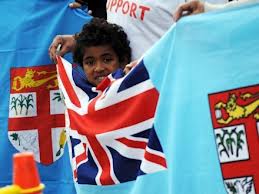As I write this it is 9pm BST on 9th October. In the Pacific timezone, Fiji Day has dawned – the country is taking note of the 42nd anniversary of its independence from British colonial rule, and submissions to Fiji’s constitution commission draw to a close.
According to reports emerging from the region, the submissions to Fiji’s constitution commission have focused on poverty and governance, with a mixed bag of views presented on whether the identity term ‘Fijian’ should be ethnically or civically applied. The international reknown of ‘Fijian’ golfer Vijay Singh is a freely acknowledged source of pride within the country, but domestically there is a reluctance to disinter the identity-label ‘Fijian’ from its application to the pre-colonial inhabitants of Fiji.
In a world riven with consciousness of ethnicity – as a fulcrum of identity that secures its meaningfulness from whatever aspect of uniqueness vis-a-vis others can successfully gain traction either among in-group or out-group members – “Fijian for Fijians” might almost appear commonplace.
And yet we demand of ethnic identity a contrapuntal existence with other seemingly paradoxical realities: in the 1990s it was globalisation, which led neatly on to a theoretical structuration of the world along glocal lines, wherein we sought to profess as coterminous, if not exactly wedded to each other, the idea of global movement and local situatedness. In the early light of the 2000s, it is transnationalism: after the whirlwind romance of ideating ourselves as citizens of the world emerges our sense of entitlement to rights, privileges and identities spanning the countries of our existence.
But in the flux of globalism and transnationalism – of diasporic identity and discourse – remains the very specific case of ethnic identity at home. We may like a successful export from our country being identified as originating from that place – Vijay Singh as Fijian – because it puts us on the map, grants us legitimacy and credibility, gives us street cred as a member state of the world; but simultaneously we want, as the people who still live and breathe the air of our homeland, to be granted a status that reflects our embodiment of the continuity between a people and its land.
I’m not Fijian, by the way. That disclaimer, I grant, may be necessary given the preceding paragraph full of reference to “we”. I have, however, conducted doctoral ethnographic fieldwork in Fiji and I do steer a stridently heuristic line of enquiry and analysis made almost inevitable because as an Indian living in Fiji I was unreflexively incorporated into native Fiji categories of identification upon arrival – I fit the ethnic framework, to be blunt.
So, we have widespread articulation of ethnicity in the world, and its forced interlocution with globalisation and now transnationalism and the modes of belonging and identity these bring – hence, it’s difficult to know anymore (if ever it was in fact easy!) what the basic constituent of identity is or ought to be.
Are we evaluating identity and belonging on the basis of territorial orgin, this being one of the significant agreed markers of ethnic identity? And if so, how willing are we to acknowledge that the moment of territorial origin – the moment in which it cleaves to a group’s collective emotional memory and mainfests a sense of belonging – may apply to the same land mass but in different moments in history and to ethnies other than ourselves?
For it is in the moment of Cession that we locate the precept of Fijian paramounty, and in the moment linking post-indenture and anti-colonial articulation that Fiji’s Indians feel themselves to be sons of the soil. The common ground between the two is the Fijian soil as the territory of origin inscribing these ethnic identities; the question is whether being able to claim longer duration of linkage to the land, as the ethnic Fijians can correctly claim, proscribes any other group from manifesting belonging to the land.
The answer is yes. And no. The Indians of Fiji wish to be known as Fijians alongside their Fijian brothers. The Fijians of Fiji wish a demarcation of iTaukei identity from other Fiji Islanders in recognition of their longer attachment to the land. I almost hesitate to suggest the solution that beckons to me, therefore, so simple is its connectedness to what Fiji’s various peoples feel for and about her….
All citizens of Fiji ought to bear the title of Fijian, with reference to ethnicity (when appropriate or necessary) leading the “Fijian” to be appended with the relevant ethnicity in all cases (so we have Fijian Indian, for example) except in the case of ethnic Fijians who ought to be accorded their historic status as iTaukei when referred to in specifically ethnic rather than civic terms.
